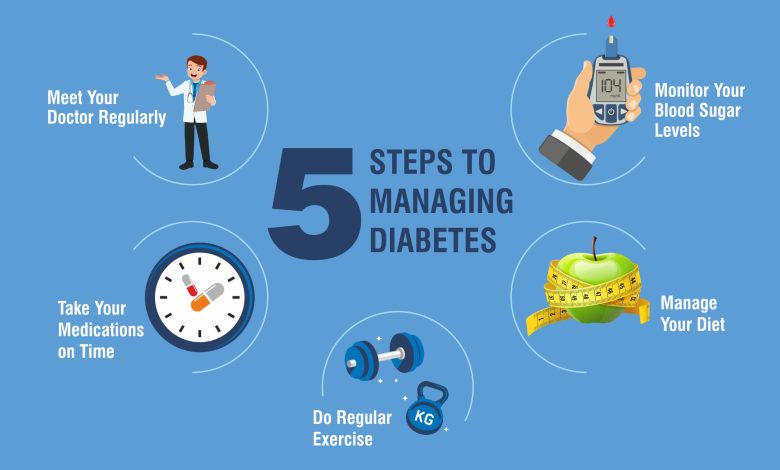Diabetes Management: Effective Strategies for a Healthier Life

Diabetes management is essential for maintaining long-term health. By understanding the types of diabetes and implementing effective strategies, you can control blood sugar levels and improve your overall well-being. Whether you have Type 1 or Type 2 diabetes, learning how to manage your condition is crucial for a healthier life :
Type 1 Diabetes: An autoimmune condition where the body attacks insulin-producing cells, often diagnosed in childhood or adolescence. It requires daily insulin therapy and careful blood sugar monitoring to prevent acute complications like ketoacidosis.
Type 2 Diabetes: A metabolic disorder that develops over time due to a combination of genetic predisposition and lifestyle factors such as poor diet and inactivity. It occurs when the body becomes resistant to insulin or doesn’t produce enough. This type is more common in adults and is often manageable through lifestyle changes and medications.
Both types require diligent management to maintain blood sugar levels within the target range, reducing the risk of complications and enhancing quality of life.

How to Effectively Manage Diabetes
Monitor Blood Sugar Levels
Regularly monitoring blood sugar is a cornerstone of diabetes management. It helps you understand how factors like meals, physical activity, and medications influence your glucose levels. Tools like glucometers, continuous glucose monitors (CGMs), or even advanced wearable devices provide detailed insights into daily patterns and help guide adjustments.
Adopt a Balanced Diet
A nutrient-rich diet tailored to your specific needs plays a pivotal role in controlling blood sugar levels. Key dietary recommendations include:
- Whole grains: Opt for high-fiber options like quinoa, brown rice, and oats to prevent rapid spikes in blood sugar.
- Lean proteins: Incorporate sources like chicken, fish, eggs, tofu, and legumes to maintain satiety and stabilize glucose.
- Healthy fats: Include nuts, seeds, olive oil, and avocados, which support heart health and moderate glucose absorption.
- Non-starchy vegetables: Prioritize leafy greens, broccoli, and zucchini for low-calorie, nutrient-dense meals.
Minimize sugary drinks, refined carbohydrates, and highly processed snacks that cause quick glucose surges.
Incorporate Regular Physical Activity
Engaging in regular exercise enhances insulin sensitivity and supports overall glucose management. A well-rounded fitness routine might include:
- Aerobic exercises: Activities such as walking, jogging, swimming, or cycling help lower blood sugar levels.
- Strength training: Building muscle mass improves metabolic health and boosts glucose utilization.
- Flexibility and balance exercises: Practices like yoga or Pilates can reduce stress and support joint health, especially beneficial for older adults.
Aim for at least 150 minutes of moderate aerobic activity weekly and incorporate strength training twice a week.
Manage Stress Effectively
Chronic stress can increase cortisol levels, leading to higher blood sugar. Adopt daily stress-reduction techniques such as:
- Mindfulness meditation: Practicing awareness and relaxation to promote mental clarity.
- Deep breathing exercises: Reducing anxiety through controlled, rhythmic breathing.
- Yoga and tai chi: Combining physical movement with mental focus to lower stress and improve flexibility.
Follow Medication Guidelines
Adherence to prescribed treatments is essential for stabilizing blood sugar. Common medications include:
- Insulin: For Type 1 and some Type 2 patients to regulate glucose levels.
- Oral medications: Such as metformin, which improves insulin sensitivity.
- Other injectables: Like GLP-1 receptor agonists, which help lower blood sugar and promote weight loss.
Work closely with your healthcare provider to ensure that your treatment plan aligns with your changing needs.
Prioritize Sleep
Sleep directly impacts your hormonal balance and glucose metabolism. Develop a consistent bedtime routine, limit screen exposure before sleep, and aim for 7-9 hours of quality rest each night.
Stay Hydrated
Proper hydration aids in regulating blood sugar and supports kidney function by helping flush excess glucose through urine. Aim to drink sufficient water daily, adjusting intake based on activity levels and climate.
Visit Your Healthcare Provider Regularly
Frequent medical checkups enable proactive management of diabetes. Important areas to monitor include:
- HbA1c levels: Reflecting long-term glucose control.
- Eye health: Screening for diabetic retinopathy.
- Foot care: Checking for ulcers or neuropathy.
- Kidney function: Detecting early signs of nephropathy.
Avoid Common Mistakes
- Skipping meals: Leads to erratic blood sugar swings and possible hypoglycemia.
- Ignoring symptoms: Early warning signs like excessive thirst, frequent urination, or vision changes should not be overlooked.
- Overeating certain “healthy” foods: Even natural sugars from fruits need portion control to prevent spikes.
Long-Term Benefits of Diabetes Management
Proactively managing diabetes yields significant health benefits, including:
- Reduced cardiovascular risk: Lowering blood pressure, cholesterol, and blood sugar prevents heart disease.
- Protecting kidney health: Avoiding progressive kidney damage.
- Preventing nerve damage: Reducing risks of neuropathy, especially in extremities.
- Preserving vision: Preventing complications like diabetic retinopathy.
By fostering a proactive and balanced approach, you not only minimize complications but also improve your energy, mood, and overall life satisfaction.
Conclusion
Diabetes is a manageable condition with the right strategies in place. Through a combination of healthy eating, regular physical activity, and consistent monitoring, you can effectively control blood sugar levels and reduce the risk of complications. Collaborating with healthcare providers, joining support networks, and staying informed are key to living a fulfilling life despite the challenges of diabetes.
Take charge of your diabetes journey today and create a future defined by health and vitality.



